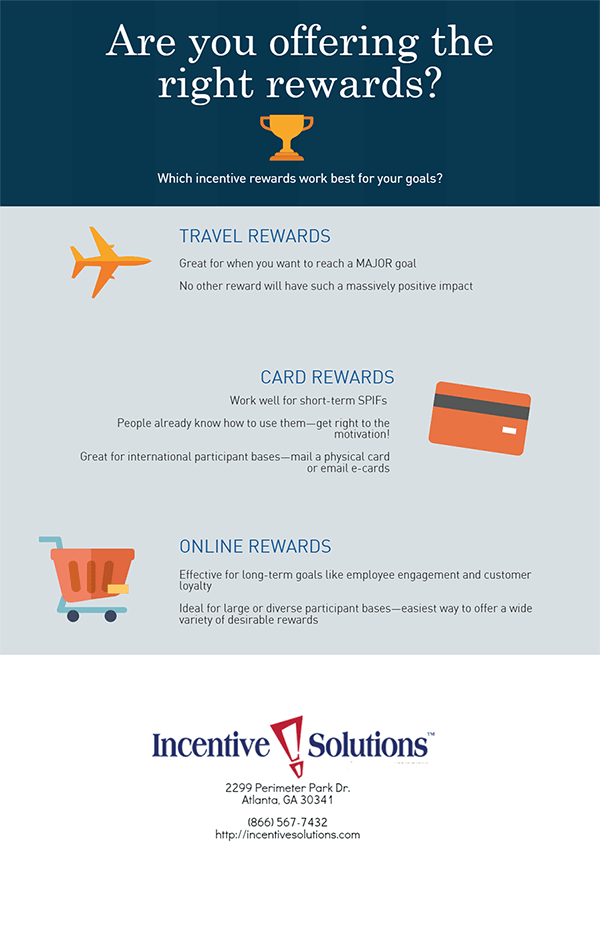2015 Landmark Study Participant Award Experience Preferences
- The study found that on average the most preferred award experience for large awards is a travel award, presented by travel executives, communicated in a public announcement, and combined with the opportunity for special networking. While small awards do correlate to a high preference for cash on average, 65% of people would select a non-cash award if all other experiential elements were optimal.
- Out of 452 respondents, 99% had a unique set of preferences – different from every other person in the study. This is, again, a strong indicator that just as we are unique individuals in our consumer shopping and lifestyle habits so also are we unique in our preferences for reward and recognition.
- In September and November 2012 Aberdeen Group surveyed 312 organizations about their sales effectiveness practices and accomplishments, specifically to understand how sales performance management is effectively deployed. Over half of respondents listed non-cash rewards and recognition as an important part of sales performance management
- 100% of Best in Class companies offered group travel and 100% offered company-sponsored events to recognize year-end sales success.
Rewards and Recognition as a Vital Compensation Component
- In September and October 2011 Aberdeen surveyed 291 companies to support research on their study “Sales Performance Management 2012: How Best In Class Optimize the Front Line and Grow the Bottom Line.”
- Best in Class companies are more than twice as likely as all other firms to provide non-cash incentives (21% of Best in Class vs 10% of other companies use R&R programs)
- Organizations that provide non-cash reward/recognition had an average year over year annual corporate revenue increase of 9.6% versus 3% for all others.
- Organizations that provide non-cash reward/recognition had a 2.1% year over year increase in revenue per sales FTE versus a 0.7% decrease for all others.
- Organizations that provide non-cash reward/recognition had a 1.6% year over year increase in team attainment of quota versus a decrease of 2.2% for all others.
- Adopters of non-cash rewards/recognition also had 34% shorter sales rep time-to-productivity and 10% shorter sales rep time-to-hire.
It’s In the Cards: An In-Depth Look at PrePaid Cards in Incentive, Rewards & Recognition Programs

- Prepaid cards are among the most popular gifts for recipients (whether as gifts from friends and family or as rewards from employers and other organizations). As above, prepaid cards are much more popular among recipients than cash. A full 44 percent of our card recipient survey respondents told us that prepaid cards are their favorite type of gift or reward. When offered a prepaid card or equivalent cash, five times as many of our respondents chose the prepaid card
- In 2007, the Foundation found that the use of prepaid cards among large companies with more than $100 million in revenue was, by a large margin, the most popular reward at 89 percent usage, followed by “token items” at 79 percent.
- Twenty-seven percent of our incentive planner survey respondents believe that prepaid cards are, dollar for dollar, the most effective form of reward. The majority, however, believe that they are among the most effective rewards (51%). 25 percent believe they are about average in effectiveness compared to other types of rewards (Figure 2). Conversely, of the 37 percent of our survey takers that do not use prepaid cards in their rewards programs, only 10 percent do not because they have tried them and are disappointed with the results.
- A broad meta-review of past research, looking into the effectiveness of incentives in general (cash and non-cash) concluded that incentive plans increase productivity between 25- 45 percent when implemented correctly (Stolovitch, Clark, Condly, 2003).
- results from our incentive planner survey in which 48 percent said that prepaid cards are effective or highly effective versus other rewards in driving engagement and loyalty. Asked a similar question, 42.5 percent of prepaid card recipients (or potential recipients) say that prepaid cards motivate them more than all or most other types of rewards. 22.5 percent say that prepaid cards motivate them less than most other rewards or do not motivate them at all.
The Role of Monetary and Non-monetary Incentives in the Workplace as Influenced by Career Stage
- The Role of Monetary and Non-monetary Incentives in the Workplace as Influenced by Career Stage
- Monetary incentives encourage compliance rather than risk-taking because most rewards are based only on performance. As a result, associates are discouraged from being creative in the workplace.
- Employers also may use monetary incentives as an extrinsic rather than an intrinsic motivator. In other words, associates are driven to do things just for the monetary reward versus doing something because it is the right thing to do.
- Incentives must be tailored to the needs of the workers rather than using the one-size-fits-all approach, which is impersonal and sometimes ineffective.
Let’s start hammering out your incentive program today!



